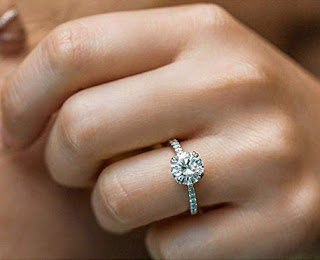When you think of an engagement ring, the first thing that
pops into mind these days is a diamond ring, but the diamond ring is rooted in
the culture of European royalty and that's not where the history of the
engagement ring begins. In fact, engagement rings can be traced back to wedding
traditions made popular during the Renaissance era. It was a band of sterling silver inscribed with a poem or "poesy" but even before this, history of the engagement ring points all the way back to the ancient Egyptians.
 |
| Some ancient engagements rings were made of bone. |
First engagement rings
In ancient Egypt the first engagement rings were made out of
hemp, leather, bone or ivory, and were worn on the fourth finger of the left
hand. These rings were thought to symbolize the endless circle of love between
a couple.
This tradition was picked up by the Greeks after Alexander
the Great conquered Egypt in 332 BC. The betrothal bands they wore, though,
were usually made of iron, unless you were wealthy. The rich wore more
expensive metals including: copper, silver or gold. At times, these rings were
engraved with a message or poem which started the tradition of engraving
engagement rings and wedding bands.
Diamond and gold engagement rings
Diamond and gold engagement rings were very rare. The most
notable was in 1477 when Archduke Maximilian of Austria bestowed one to Mary of
Burgundy. Medieval Italians used precious stones as part of the groom's payment for his bride. They gave a diamond engagement ring because they believed the diamond was crafted in the flames of love.This payment symbolized the groom's intent to marry.
Then in 1518, the two-year-old Princess Mary, daughter of King Henry VIII, was given a diamond ring as a promise for an arranged marriage with the infant son of King Francis I of France.
Then in 1518, the two-year-old Princess Mary, daughter of King Henry VIII, was given a diamond ring as a promise for an arranged marriage with the infant son of King Francis I of France.
For the most part, regular every-day people couldn't afford
an expensive ring as a pledge of faithfulness. In the 15th through
the 17th century in Eastern Europe, plain poesy rings (gold finger rings with a short
inscription on their surface) with inscribed messages made popular betrothal
rings.
Gimmel rings
In Ireland, a wedding tradition that began during the Renaissance, included interlocking gimmel rings. One of the rings served as a betrothal ring for the bride, another was worn as a betrothal ring for the groom, and the third ring was held by the best man until the wedding day.
Evolution of engagement rings
Until the late 19th century, engagement rings
among the wealthy were made from colored gemstones. Once African diamond mines
made the precious gems more accessible, the Victorians favored a heart-cut
solitaire diamond accented with rubies which were a symbol of passionate love, sapphires
carried divine favor, or emeralds, which were thought to attract good fortune.
Emeralds were historically the sacred stone of Aphrodite, the Greek goddess of
love, and Venus, the Roman goddess of passion.
 |
| Victorian Era Engagement Ring |
Times changed, and with them wedding traditions and customs evolved.
Dowries became a tradition of the past, laws changed, and women were able to
sue their fiances for breaking engagements. Engagement rings became a source of
financial security and were made of rubies, opals, emeralds and turquoise.
 |
| Princess cut single solitaire engagement ring |
Tiffany introduced single solitaire engagement ring
It was Tiffany & Co. who introduced the single solitaire
in the U.S. in 1886. This ring style was drastically different than the
customary embedded bezel mount. The new cut showcased the jewel's natural shine
and quickly became the most requested ring by American brides. It is still the
most popular engagement ring setting in the U.S. today, with an estimated 80 percent of modern brides wearing a diamond engagement ring. This popularity can be traced back to the marketing campaign of DeBeers back in 1947 -- "A Diamond
is Forever." It embedded the diamond engagement ring into America's mainstream
society as the most coveted of engagement rings.
* * *


